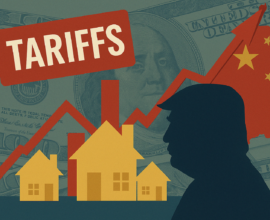Why the Housing Market Will Crash in 2022
EDIT 01/01/2023: Boy did this article miss the mark!
2021 has seen a significant increase in property prices due to many reasons that I explored in my previous article.
Given the unexpected and rapid rise in home values during the pandemic, a lot of people are concerned about a real estate bubble and a general housing market crash in 2022. The market is practically screaming “Yes, we are in a bubble, prepare for the POP!” The good news for foreclosure auction investors is, there will be more county foreclosure auctions in pop or not!
Right now, we are in the denial phase. The usual talking heads are out to convince us that this isn’t a bubble, this is the new normal, this time it’s different. The simple fact is that no housing market has ever grown this fast, this broadly and spectacularly, without getting knocked back down to earth in a similarly spectacular way.
A Cooling of the Market Is Inevitable
A recent Reuters poll of 40 real estate analysts suggests that house values in the U.S. will rise more slowly in 2022. The surveyed analysts estimated that values would rise by 10.6% in 2021, followed by a slower rise of 5.6% in 2022.
Even Chief Economist Lawrence Yun of National Association of Realtors estimates that the housing market will downshift next year. As Yun stated in May 2021, “With more inventory and some easing in demand, home prices are expected to shift to mid-single-digit appreciation by the fourth quarter and in 2022.”
He adds, “huge wealth gains from both housing equity and the stock market have nudged up all-cash transactions, but first-time buyers who need mortgage financing are being uniquely challenged with record-high home prices and low inventory.”
If this sounds like a pretty conservative theory to some “cooling” of the market, consider the source. There will never be agents out sounding the alarm bells until the meltdown is already upon us. Those of us who made it through the Great Recession can easily recall how, even at the first 10% drop, most agents said it was just a bump in the road and things would bounce soon.
Obviously, they didn’t, and at each of the 10% drops over the next year they said the same. It wasn’t until closer to the 30% mark that we started hearing “The end is nigh!” from that group of professionals.
The Housing Supply Trend Will Reverse
Housing supply across the U.S. remains well below normal level, but there are two things that will reverse this trend. The first trend is inventory growth. If more homes come onto the market in 2022, this could kill home prices ascending further into the clouds and will bring balance to the market.
When the potential sellers who for whatever reason haven’t entered the market yet start to sense they are going to miss selling at inflated levels, that is when things will turn ugly. When the first waft of “have we already the top” sentiments start to roll out, there will be a rush of inventory that will certainly go stale and need lowered prices to move.
Another factor that could have a cooling effect on the market is lack of affordability. Many U.S. cities are becoming increasingly out of reach to an ever-growing number of residents. Housing markets become less affordable and then the demand from buyers drops off.
“In May, the average listing was only on the market for 17 days. For it to become a buyer’s market, ‘For Sale’ signs need to stay up for at least 30 days,” says Logan Mohtashami, lead analyst at Housing Wire.
Unless construction picks up, the outlook for prices in 2022 isn’t promising. In his best-case scenario, he sees price growth cooling and housing supply bouncing back in 2022.
Demographics can complicate the outlook. If the surge of first-time buyers, mostly millennials, falls short, it could be a sign of a bigger issue in the housing market in 2022. Many millennials haven’t bought a first home, or they are paying higher rents, so it’s hard to accumulate a down payment. They may also have debts such as student debt still hanging over their heads.
Hillary Hoffower of Insider reported that “this generation’s homebuying prospects were already hammered by the Great Recession. With the pandemic sending prices through the roof, this generation could become trapped in a vicious cycle of only renting and never having a home of their own.”
The Pitfalls of Inflation
Inflation too is running at its hottest in a very long time, which can affect mortgage rates, which are currently running in the 3-5% range.
Assuming the economy remains solid, starting sometime in 2022, they can gradually raise short-term rates over two to three years. That will in turn push up the entire yield curve to a level close to recent historical norms. This translates to 4-5% on the 10-year treasury yield, resulting in 5-6% on 30-year mortgage rates.
Many bankers and economists are sounding alarm bells about a “what if” scenario in which the Federal Reserve and other banks around the world wait too long to combat inflation by raising interest rates.
If this policy mistake is made, then it could cause big disruptions in the housing market in 2022. If the Fed is forced to raise interest rates by 1% plus within a month, the ripple effects could be fierce.
Loan originators would freeze out amid a rush of people trying to get applications in under the wire. Deals could flow to a snail’s pace. The average selling prices would probably drop, and prices may stop rising at the clip they have been, especially in the past year.
Always Be Prepared for a Housing Market Crash
There are strategies that investors should keep in mind when preparing for a potential housing market crash. Remember the adage “failure to prepare is to prepare for failure”!
- Don’t over leverage as this can put a strain on any business should there be a drop in real estate prices. If you’ve maxed out all your debt, then you may leave yourself no breathing room should you need to refinance your assets or access equity.
- Keep your liquidity. Cash is king, and access to your capital is key during crash situations. Cash keeps your business afloat and gives it a possible lifeline. It also gives you as the investor more flexibility for opportunities that may come your way in a down market.
- If you are a landlord, focus on your tenants — they give you cash flow and passive income. Give them resources during hard times, especially during the pandemic.
The St. Louis Federal Reserve, in looking at 2019 recession signals for housing, stated “it’s noteworthy that several indicators of housing-sector momentum currently line up reasonably well with patterns seen before the past three recessions.”
Large scale evictions, foreclosures, and delinquency concerns have been temporarily halted due to the pandemic. There is still a vast number of people unable to pay their rent or mortgages.
Government intervention, including stimulus payments, has been a lifesaver for many, but when government intervention stops, the system will play out. This could predicate a housing market crash in 2022. Combine this with the sheer panic this could induce with current homeowners worried about missing the boat, or worse, going underwater, we could be in for a crash similar to the last Great Recession.
The bottom line is that investors need to prepare themselves for each market cycle, including a real estate market crash. But on a brighter note, this can also bring many opportunities to purchase some great foreclosure deals that may come up on PropertyOnion.com.








